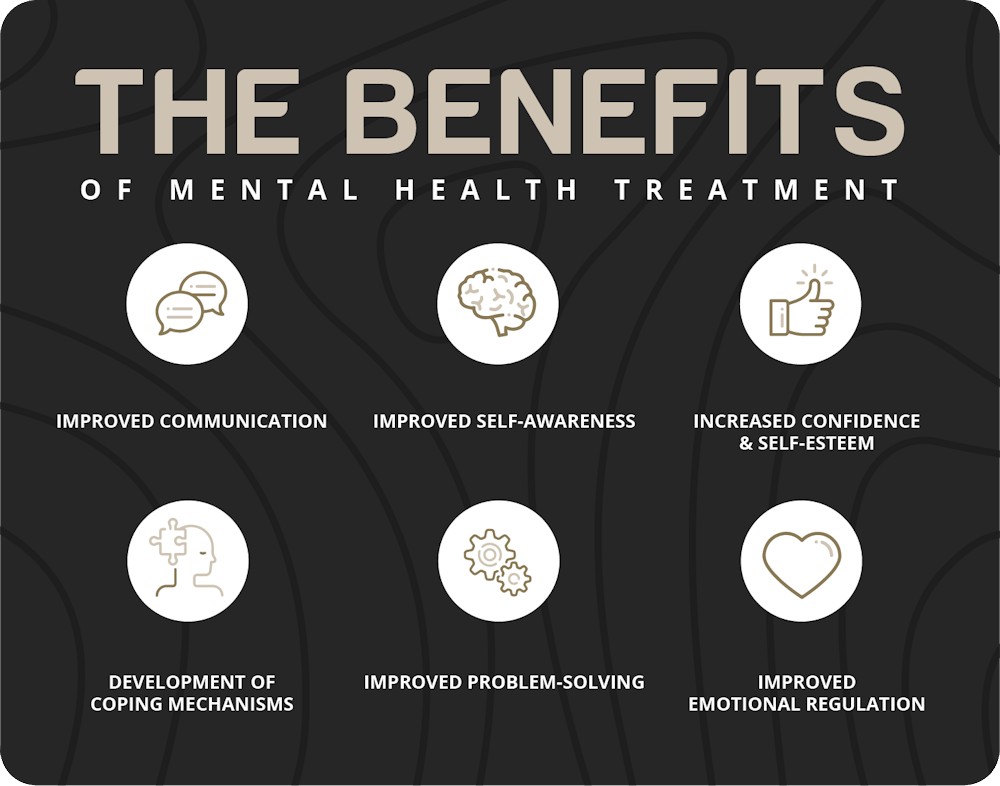Get This Report on Mental Health Counseling
Table of ContentsNot known Facts About Mental Health CounselingGetting The Mental Health Counseling To WorkThe Ultimate Guide To Mental Health CounselingThe smart Trick of Mental Health Counseling That Nobody is DiscussingExamine This Report on Mental Health Counseling
Via treatment, you can get insight right into your own patterns of behavior and communication, which can lead to more meeting and pleasing partnerships with friends, family, and romantic partners. What we assume, we show up. If you're eaten with unfavorable emotions and negative thoughts that are disrupting your life, treatment can assist., or there are various other negative means you act. Therapy can help you modify those habits that are having a negative influence on your world and relationships.

Getting therapy to attend to certain facets of your life can aid you be a lot more effective in various other locations, including job.

Not known Factual Statements About Mental Health Counseling
There are also a lot more benefits of therapy than just the ones we have discussed., or build relationships (romantic or those with family or friends) in a healthy means.
For the objective of today research study, viewed benefits and obstacles to psychological health and wellness help-seeking are being checked out. Previous research found that regarded obstacles have a substantial impact on university student' health actions selections (Von Ah, Ebert, Ngamvitroj, Park & Kang, 2003). Viewed benefits and obstacles to help-seeking were particularly chosen because of their influence on decision-making and eventually action (Glanz, Rimer, & Su, 2005).
The existing research study seeks to examine whether preconception works as a barrier to therapy amongst college pupils. Eisenberg et al. (2011) suggested that uncertainty regarding treatment efficiency is one more barrier to joining treatment. Research searchings for exposed that college pupils backed numerous barriers to joining therapy. Mental Health Counseling. Among these were: (1) liking to deal with psychological health troubles themselves, (2) not having enough time to join treatment, (3) inquiries about whether psychological wellness treatment is reliable in remediating problems, (4) an idea that stress is regular or the problem will improve without therapy, (5) absence of cash, and (6) worry regarding what others would certainly think if they learnt about therapy involvement.
(2006) reported comparable variables as obstacles to looking for therapy and additionally located that a mistrust of companies might hamper pupils from looking for aid. Team in campus mental health centers may be perceived as unfriendly, and long wait read more times for services may be "off-putting" for trainees. Elements helping with a lot more favorable perspectives are often at the opposite pole of those variables identified as barriers.
7 Simple Techniques For Mental Health Counseling
One in three (34.6%) reported living on university and one in 4 (23.3%) reported coping with parents. Nearly half of students were associated with campus companies and 1 in 10 reported remaining in a fraternity or sorority. Greater than one-third of students (38.1%) reported that they had a relative or buddy with a detected mental health and wellness problem.

Getting The Mental Health Counseling To Work
Univariate F-tests recognized details subscale things that significantly differed. Women were much less most likely than men to view people that most likely to therapy as psychologically weak, people who go to counseling as crazy, to really feel that people with psychological wellness issues must manage issues by themselves, that individuals who most likely to therapy as unable to fix issues, that individuals that most likely to therapy slouch, and to feel that people that go to counseling are various from normal individuals in an adverse method.
Research results revealed that women were considerably much less likely than men to hold stigma-related mindsets. This is regular with previous research study which additionally located that males hold greater levels of viewed preconception than women (Chandra & Minkovitz, 2006). Based upon study findings, it is noticeable that over at this website males might be much less likely than women to look for treatment because of reduced perceived barriers along with high stigma-related attitudes.
Mental Health Counseling Fundamentals Explained
Furthermore, college health professionals may provide academic programs targeting men with info on the advantages of psychological health and wellness treatment and the significance of seeking assistance when needed. All techniques must be examined with future study to identify the result on university pupils, specifically men. In contrast to basic population research studies which reveal that women are more probable to seek psychological wellness solutions compared to men (Haunstein et al., 2006; Mackenzie, Gekoski, & Knox, 2006), today research located no substantial distinctions in the variety of viewed barriers to help-seeking behaviors based upon sex.
Researchers guess that this is mainly due to standard social standards and gender roles that identified men based on strength and absence of psychological expression (Addis & Mahalik, 2003; Ang, Lim, Tan, & Yau, 2004; Mojtabai, 2007). In general, there have been combined results among the university student population regarding sex distinctions (Rosenthal & Wilson, 2008). This finding was unanticipated and might highlight that those that had actually received therapy had a much better idea of delay times and other "accessibility" obstacles that may make it hard visit their website to begin therapy. Possibly, participants that have actually received therapy view extra barriers than individuals that have not obtained therapy since looking for therapy solutions again could include worry of self-disclosing personal details to a new therapist.